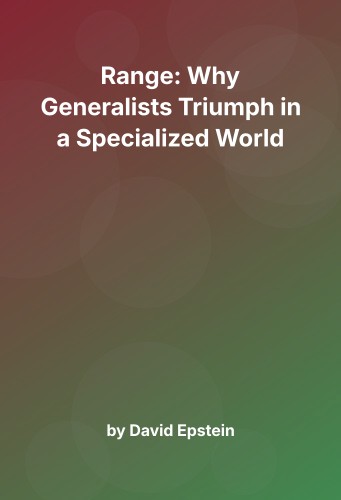Embracing the Power of Generalists in a Specialized World
In “Range,” David Epstein challenges the prevailing belief that specialization is the key to success in today’s complex world. Instead, he argues that generalists, with their broad range of experiences and skills, are better equipped to tackle the unpredictable challenges of the modern landscape. This concept is particularly relevant in an era defined by rapid technological advancements and digital transformation.
The Myth of Early Specialization
Epstein begins by debunking the myth that early specialization leads to long-term success. Drawing on examples from various fields, he illustrates how individuals who explore diverse interests often outperform those who specialize early. This insight aligns with the Agile methodology, which emphasizes adaptability and cross-functional skills over rigid specialization.
To understand this further, consider the contrasting approaches discussed in Malcolm Gladwell’s “Outliers,” where the “10,000-hour rule” is often cited as a path to mastery through specialization. Epstein counters this with evidence that a breadth of experience is equally, if not more, valuable. For instance, athletes who engage in multiple sports often develop a diverse set of skills that enhance their performance when they eventually specialize.
The Benefits of Breadth
The book highlights the advantages of having a broad skill set. Generalists are more adept at connecting disparate ideas, which fosters innovation and creativity. In the business world, this translates to enhanced problem-solving capabilities and the ability to pivot in response to market changes. Epstein’s arguments echo the principles of design thinking, where diverse perspectives drive the creation of innovative solutions.
Adam Grant’s “Originals” also supports this notion, emphasizing how non-conformists harness diverse experiences to challenge the status quo and innovate. For example, Steve Jobs famously integrated his interest in calligraphy into Apple’s design philosophy, which became a cornerstone of the company’s success.
Learning from Diverse Experiences
Epstein emphasizes the importance of learning from a variety of experiences. He cites numerous examples of successful individuals who have thrived by drawing on knowledge from different domains. This interdisciplinary approach is crucial in today’s digital economy, where the convergence of technology and business necessitates a holistic understanding of both fields.
For instance, consider the career trajectory of Elon Musk, who has ventured into software, automotive, and aerospace industries, leveraging his diverse background to drive innovation across these fields. This mirrors the interdisciplinary successes outlined in “The Medici Effect” by Frans Johansson, which explores how breakthroughs occur at the intersection of different disciplines.
The Role of Analogical Thinking
One of the key insights from “Range” is the value of analogical thinking. Generalists excel at drawing parallels between seemingly unrelated concepts, leading to breakthrough innovations. This skill is particularly valuable in digital transformation efforts, where organizations must integrate new technologies into existing processes in creative ways.
A practical example is how the principles of aerodynamics were applied to competitive cycling, revolutionizing bike designs and rider gear. This type of cross-domain application is a testament to the power of analogical thinking, a concept that is also thoroughly examined in “Where Good Ideas Come From” by Steven Johnson, which highlights how innovative environments foster such connections.
Navigating Uncertainty with Flexibility
In a rapidly changing world, flexibility is essential. Generalists, with their diverse backgrounds, are better equipped to navigate uncertainty and adapt to new challenges. This aligns with the concept of resilience in leadership, where the ability to pivot and adjust strategies is crucial for long-term success.
Generalist leaders are often compared to Swiss Army knives, able to apply a variety of tools and perspectives to unexpected problems. Jim Collins’ “Good to Great” explains how companies that embrace flexibility in leadership styles often outperform those with rigid structures.
The Case for Deliberate Practice and Exploration
Epstein acknowledges the importance of deliberate practice but argues that exploration is equally vital. By experimenting with different roles and industries, professionals can discover their true passions and strengths. This approach mirrors the modern career trajectory, where lateral moves and varied experiences are increasingly common.
Leveraging Technology for Broader Learning
In the digital age, technology offers unprecedented opportunities for learning and growth. Epstein encourages professionals to leverage online courses, webinars, and digital resources to expand their knowledge across multiple domains. This proactive approach to learning ensures that individuals remain competitive in an ever-evolving job market.
Building Agile Teams with Diverse Skill Sets
For organizations, the insights from “Range” underscore the importance of building agile teams with diverse skill sets. By fostering a culture of continuous learning and encouraging employees to explore new areas, companies can enhance their innovation capabilities and drive digital transformation initiatives.
Final Reflection: Redefining Success in a Complex World
“Range” challenges conventional wisdom about specialization and highlights the value of a broad, adaptable skill set. In a world characterized by rapid change and complexity, generalists are uniquely positioned to thrive. By embracing the principles outlined in the book, professionals and organizations can navigate the challenges of the digital age and achieve lasting success.
This synthesis of ideas across domains—from business to technology to leadership—demonstrates the universal applicability of Epstein’s insights. The generalist approach not only prepares individuals for the unpredictable nature of modern work but also equips organizations with the agility needed to innovate and adapt continually. By integrating the perspectives presented in “Range” with complementary insights from other thought leaders, one can appreciate the profound impact of diverse experiences on personal and professional growth.

